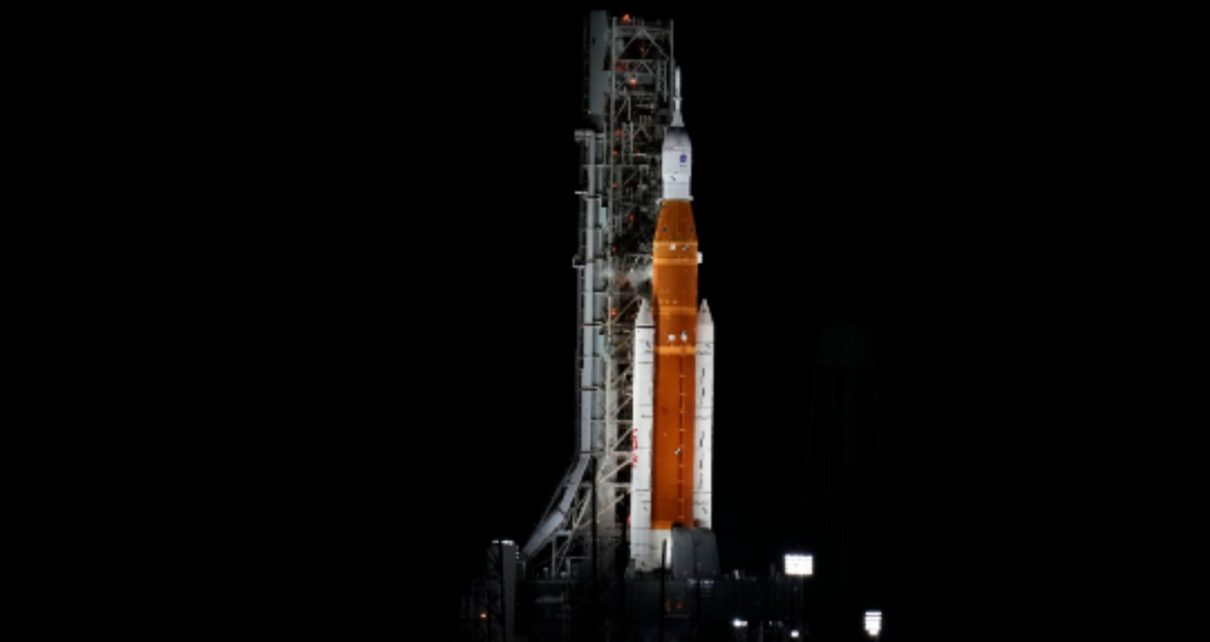
On Monday, August 29, 2022, at Cape Canaveral, Florida, NASA's new moon rocket is positioned on Launch Pad 39-B just before takeoff. (AP Photo/Chris O'Meara)
Engine Issues Force NASA to Delay Launch of Historic Artemis I Moon Rocket
By TheNevadaGlobeStaff, August 29, 2022 7:46 am
NASA had to cancel the launch of its strong new moon rocket on Monday morning during a shakedown flight with three test dummies aboard due to a fuel leak and then an engine issue during final liftoff preparations.
The earliest possible date for the next launch attempt is Friday.
Because of a leak of highly explosive hydrogen in the same location that experienced seepage during a dress rehearsal back in the spring, NASA repeatedly stopped and restarted the fueling of the Space Launch System rocket with nearly 1 million gallons of super-cold hydrogen and oxygen as precious minutes passed.
Then, according to officials, NASA encountered further difficulties when it was unable to adequately freeze one of the rocket’s four main engines. After the launch was postponed, engineers proceeded to collect data and identify the issue’s root cause.
The rocket was due to launch on a mission to place a crew capsule in orbit around the moon. The launch is an important step in America’s effort to return people to the moon for the first time since the Apollo program was terminated 50 years ago.
The 322-foot (98-meter) spacecraft is NASA’s most potent rocket ever, outperforming even the Saturn V that sent the Apollo astronauts to the moon.
When asked when NASA might attempt another launch, launch commentator Derrol Nail said the problem was still being investigated and that “we must wait to see what shakes out from their test data.”
There were no astronauts aboard the rocket’s Orion capsule. Instead, the test dummies, which are equipped with sensors to measure vibration, cosmic radiation, and other conditions, were strapped in for the six-week mission, which is set to conclude in October with the capsule’s splashdown in the Pacific.
Despite the fact that no one was on board, thousands of people flocked to the coast to watch the rocket take off. Vice President Kamala Harris was expected to be among the VIPs.
When it happens, the launch will be the first flight in NASA’s new moon-exploration program, Artemis, named after Apollo’s mythological twin sister.
Assuming the test goes well, astronauts will board for the second flight and fly around the moon and back as early as 2024. A two-person lunar landing could occur by the end of 2025.
The issues encountered on Monday were reminiscent of NASA’s space shuttle era, when hydrogen fuel leaks disrupted countdowns and delayed a series of launches in 1990.
Later that morning, NASA officials noticed what they thought was a crack or other defect on the core stage — the big orange fuel tank with four main engines on it — but it turned out to be just frost buildup.
Charlie Blackwell-Thompson, the launch director, and her team also had to deal with a communication issue involving the Orion capsule.
Engineers scrambled late Sunday to figure out what caused an 11-minute delay in communication lines between launch control and Orion. Even though the issue had been resolved by Monday morning, NASA needed to know why it occurred before committing to a launch.
Credits: Fox Reno
Copyright 2022 775 Times, NV Globe. All rights reserved.



